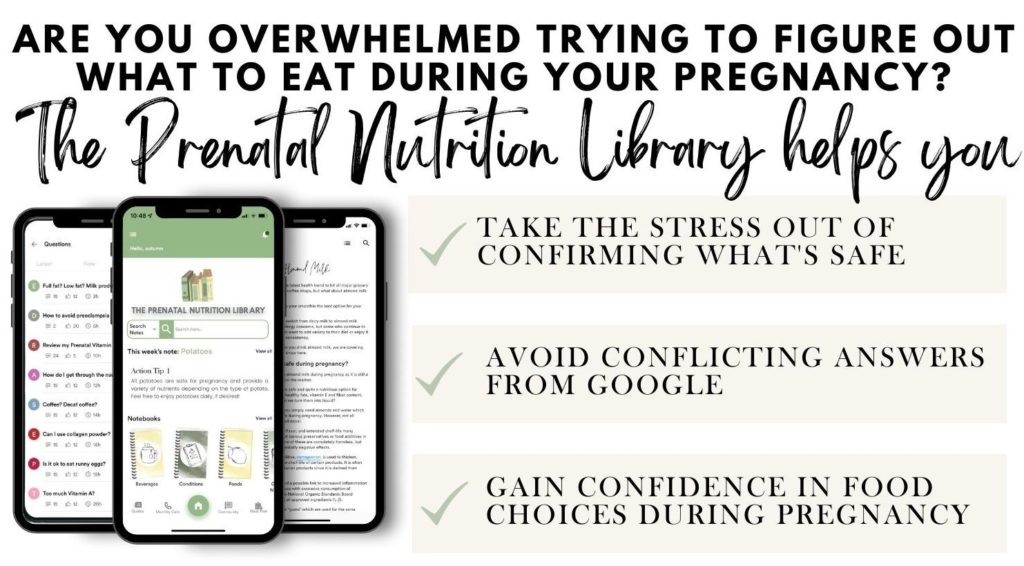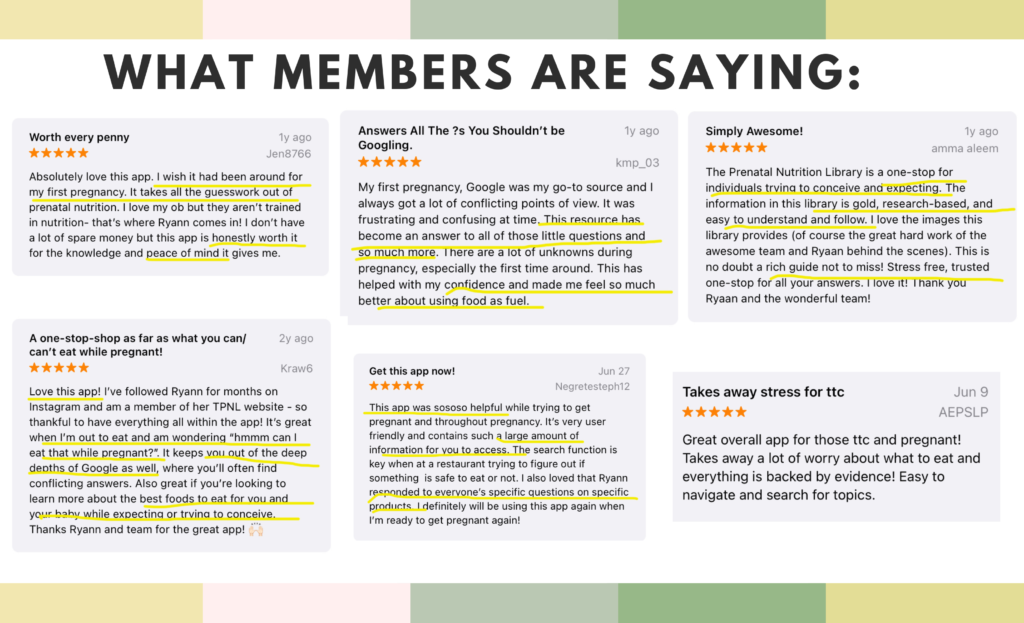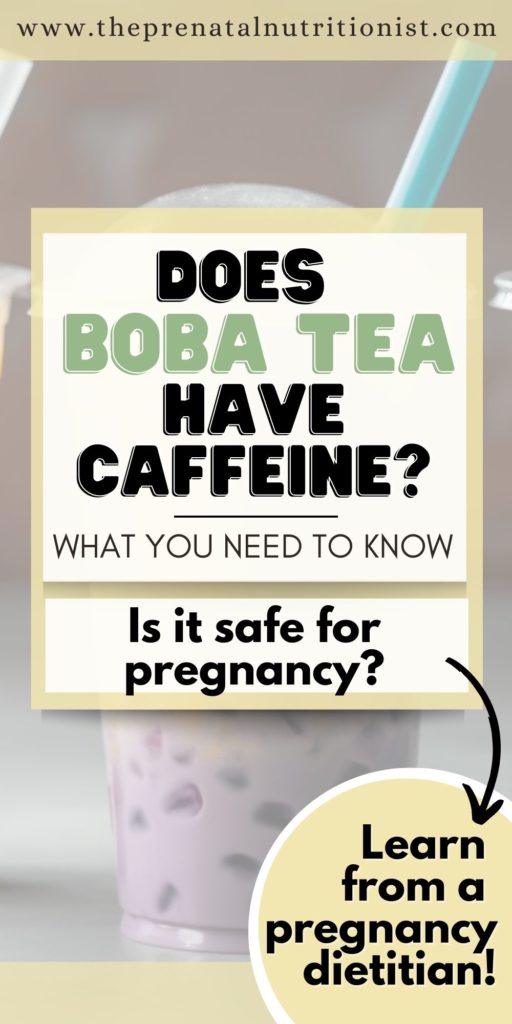
Whether it’s a hot summer day or a chilly winter evening, boba tea is a refreshing drink enjoyed all year round by people everywhere—no wonder several members of The Prenatal Nutrition Library have asked about its safety during pregnancy. Boba tea is also known as bubble tea or pearl milk tea. It is a tea-based beverage that originated in Taiwan. Its unique combination of sweet, chewy, and lightly tea-flavored tastes has attracted a huge fan following worldwide.
Boba tea’s delicious flavors and soothing ingredients offer the perfect comforting drink. Due to the popularity of boba tea, many women wonder if they can safely continue drinking this beloved beverage during pregnancy. Because it’s a tea beverage, questions often arise about the caffeine content, too. After all, most teas contain at least a small amount of caffeine.
Today’s post discusses whether or not boba tea contains caffeine and whether it is safe for expecting mothers. As boba tea is made using multiple ingredients, including tea, fruit flavors, tapioca balls, and milk, it is important to understand how each component can impact the caffeine content, sugar content, and overall safety profile.
Learning more about the caffeine and added sugar amounts in boba tea will help you make informed choices about including this enjoyable drink in a nutritious diet during pregnancy.
*You can also dive deep into the research on caffeine during pregnancy inside The Prenatal Nutrition Library.
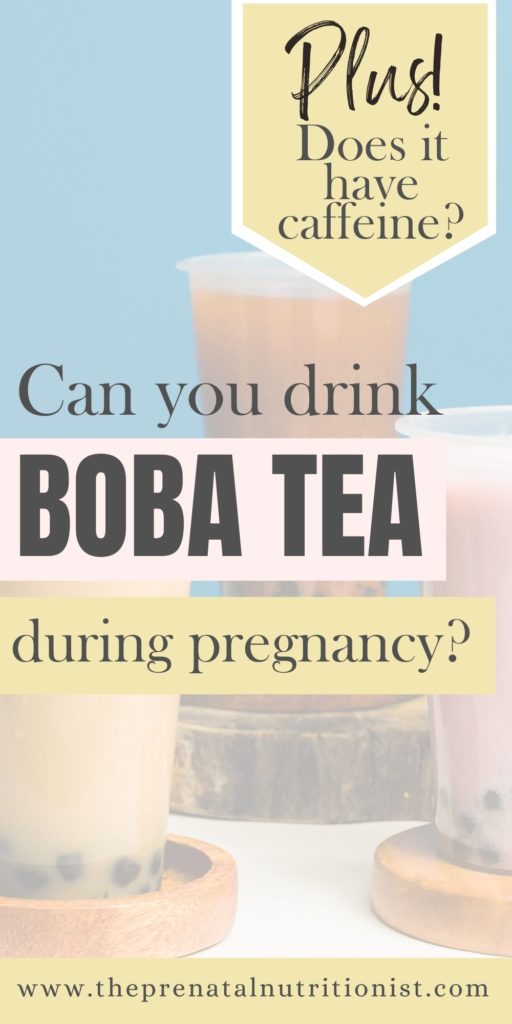
Does Boba Tea Have Caffeine?
The answer is– yes, boba tea typically does contain caffeine. However, the specific caffeine content can vary depending on the type of tea used and preparation methods.
Most boba tea shops use black, oolong, or green tea leaves to brew the tea base of the drink. Traditional boba tea uses black tea or green tea. This is similar to jasmine and chai tea mentioned in my previous posts, which also naturally contain caffeine. Black and oolong tea leaves tend to have more caffeine than green tea leaves.
A typical 8-fluid-ounce serving of boba tea contains less caffeine than a standard cup of coffee, which has around 95 mg of caffeine on average. Bubble tea generally ranges between 20-80 mg of caffeine per 8-fluid-ounce serving, depending on the base tea type and steeping time. Some coffee shops add extra caffeine sources, which would increase this number.
Factors like the tea variety, number of tea leaves used, and steeping duration can influence the exact caffeine levels extracted. Generally, the longer the steeping time, the higher the caffeine content. Choosing teas brewed with fewer leaves or steeping for less time may help reduce the caffeine amount slightly.
Fruit-based or milk-based boba teas may have lower caffeine content or be caffeine-free if they don’t include tea as an ingredient. It’s a good idea to inquire about the specific ingredients and tea types used in the boba tea you’re considering.
All in all–while boba tea contains some caffeine from the tea base, the caffeine is still generally lower than the recommended limits for pregnancy. Additionally, it’s usually possible to adjust the caffeine content at coffee shops (some boba shops) by asking for modifications like half-caffeinated. For many pregnant women, bubble tea can safely fit as part of a balanced diet in moderation.
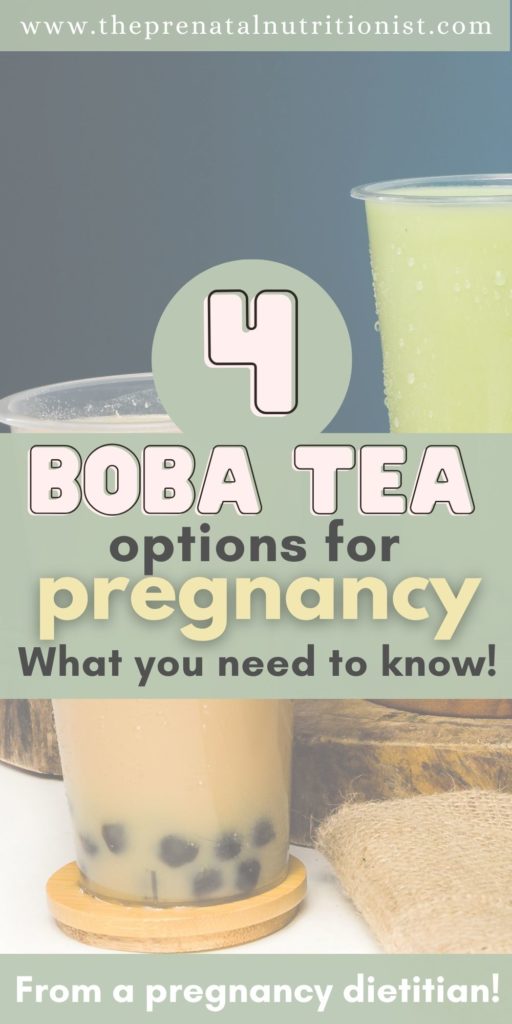
Black Tea
Black tea is a common tea base used in boba drinks. It contains more caffeine than green tea at about 30-50mg per 8 oz serving. Black tea goes through a full oxidation process, which increases caffeine levels. There are many varieties of black tea, including English Breakfast black tea, or Earl Grey. Longer steeping times will extract more caffeine from black tea leaves.
Green Tea
Green tea typically provides the lowest caffeine content of common non-herbal tea types. It has about 25 mg of caffeine per 8 oz serving. During the production of green tea, the leaves undergo minimal oxidation. This equates to it generally having less caffeine. A green tea base in boba tea can be a pregnancy-friendly option. Steeping time can be limited to 5 minutes or less to minimize caffeine extraction.
Oolong Tea
Oolong tea is partially oxidized, which gives it a caffeine profile between green and black teas. It typically contains around 35 mg of caffeine per 8 oz. Like green tea, oolong benefits from a shorter steeping time of 2-3 minutes to reduce caffeine. The roasted aromas of oolong pair beautifully with flavors like lychee.
Jasmine Tea
Jasmine tea is usually a green tea blended with jasmine flowers. It provides around 25-40 mg of caffeine per serving, again depending on steeping duration and quantity—the floral notes of jasmine tea balance subtly with tart fruit flavors in boba drinks. Go for high-quality loose-leaf jasmine tea for the most nutrients.
For more on jasmine tea and its relationship with pregnancy, read my post on “Does Jasmine Tea Have Caffeine?”
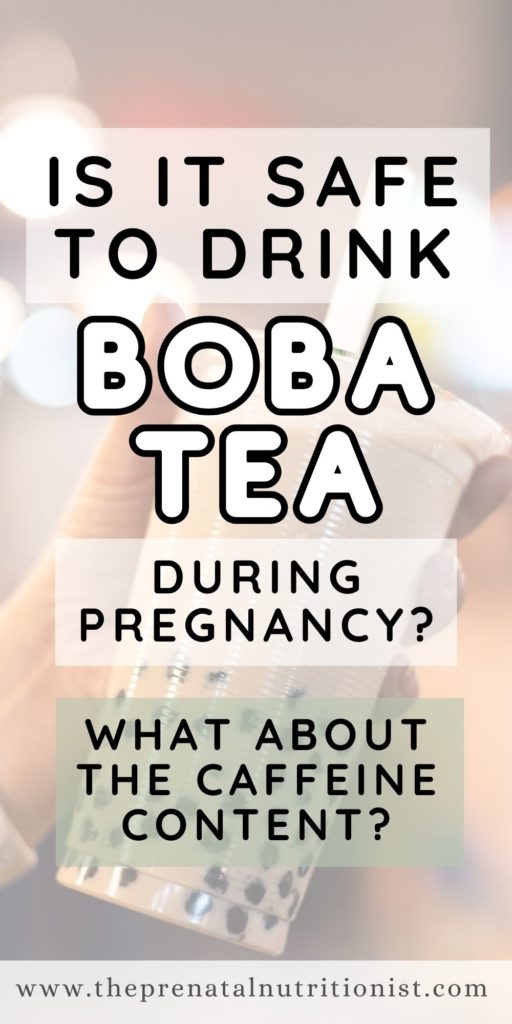
Is Boba Tea Safe During Pregnancy?
When consumed in moderation, boba tea can be considered a safe drink for most women during pregnancy. While it does contain caffeine from the tea base, the levels are generally lower than the recommended limits for pregnancy. Read more on this topic inside The Prenatal Nutrition Library.
However, it’s important to consider that boba tea contains other ingredients beyond tea, including sugar, milk, and sometimes flavorings or food colorings. These extras must be mindfully consumed as part of a healthy pregnancy diet.
Boba tea can be very high in added sugar. Fortunately, most shops allow you to make modifications and request options like half-sweet or a lower percentage of sweetener. Being mindful of added sugar intake during pregnancy is important for many reasons. This is true for those diagnosed with gestational diabetes and those without this diagnosis.
The type of milk used is also something to be mindful of. Whole milk or unsweetened nut milk varieties are good options when they are available. Sweetened nut milk options will be higher in added sugar.
Artificial flavorings, food colorings, and preservatives in some mass-produced boba mixes are best consumed minimally or avoided. They are not nutrient-dense ingredients.
Some may need to avoid boba tea or limit their intake. For those considered “high-risk” during pregnancy, it may be best to avoid caffeine altogether. See if they have decaf options!
When enjoyed in moderation as an occasional treat, boba tea can be part of a balanced diet for many pregnant women. As always, overall diet versus any one choice is the most critical priority!
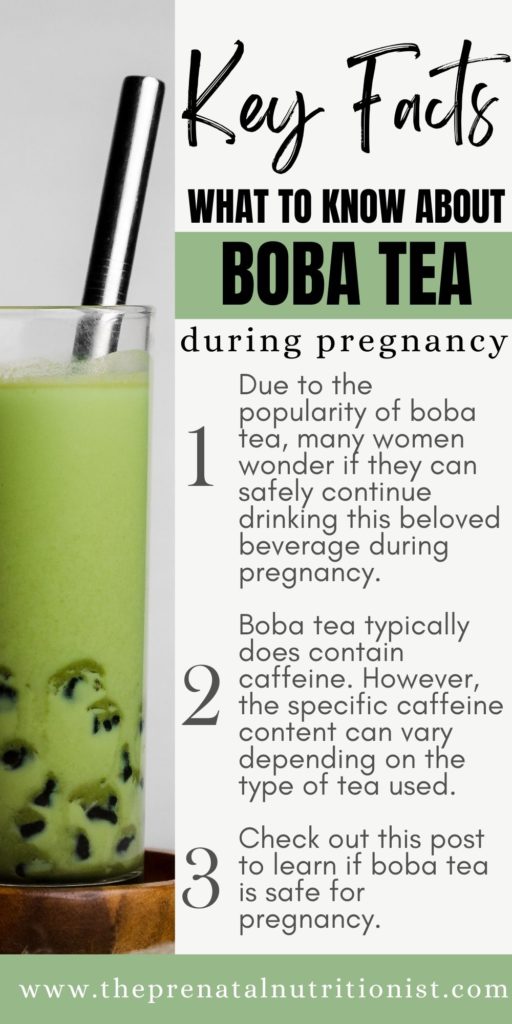
Boba tea is safe, provided you monitor your overall caffeine and added sugar intake.
In summary, while boba tea contains caffeine from the tea base, it can still be safely enjoyed in moderation for most women during pregnancy. The key is considering your overall caffeine intake from all sources and being mindful of added sugars.
Consider requesting modifications to reduce sweeteners and choose options made with high-quality tea and unsweetened milk to better support blood sugar balance. Green, white, or oolong tea bases generally provide the lowest caffeine amounts. Some fruit and milk varieties may be made without caffeine, although this isn’t “traditional” boba tea. You can always ask!
Focusing on a well-balanced diet, incorporating plenty of fluids, and being mindful of overall added sugar and caffeine intake are just a few aspects of a healthy pregnancy. Make my blog your go-to guide for all things food and nutrition for pregnancy. I answer common prenatal nutrition questions weekly on the blog, including “Does Chai Tea Have Caffeine?” and “Are Energy Drinks Safe While Pregnant?”.
For more in-depth information on nutrition during pregnancy and expert-crafted trimester-specific meal plans, check out The Prenatal Nutrition Library (TPNL). The Prenatal Nutrition Library is your one-stop shop for evidence-based answers to all your pregnancy nutrition questions so you know what you eat is safe and provides optimal nutrients for pregnancy.
Want to try a sample meal plan first??? Download my FREE 1-week meal plan for pregnancy!



